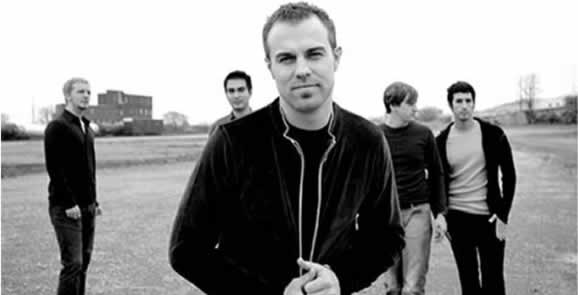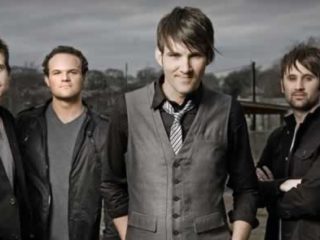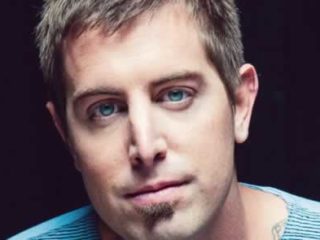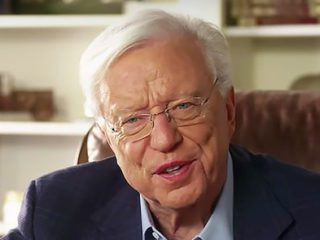As amazing as it may seem for him to consider, Jeff Deyo is coming to grips with the fact that he is truly one of the pioneers of modern worship. While it wasn’t his initial intention, his creative influence has continued to bring fresh energy, inspiration and innovation to the new worship revolutions he helped ignite.
I understand if you’d rather move on and talk about other things, but I’d love to hear what happened with SonicFlood, in your own words.
I don’t mind. It’s a transitional time, people are going to be wondering. It’s cool.
So what happened?
The band started a very different way than most people think. It originated as the band Zilch, which was Otto Price, Jason Halbert, and myself. We started and produced the SonicFlood album. Then after the album was done, or maybe just before it was, we decided to change our name to Sonicflood. Otto decided he wanted to leave the band — or not really leave, but just get off the road. He’d been traveling with dc Talk for so many years; now he’s happily producing and spending time with his family. So at that time, when he left, we recruited a couple of new band members — we recruited Dwayne [Larring] to play guitar, and Aaron [Blanton] to play drums. And we prayed for a while about a bass player and then Rick [Heil] came along. But Rick came along after we had already taken the pictures of the band for the album and all that.
(Pauses.) I think everything really went fast and furious. Obviously, the SonicFlood album blew up and sold like crazy. No one had any idea if it would sell 5,000 copies or 10,000 or what.
And in no small way, I think that album’s success contributed heavily to the birth of the Modern Worship movement here in the U.S. It was like, exactly the right thing at the right time.
Yeah. Had we made the Sonicflood album three years prior, I don’t think it would have done anything. I really don’t. ‘Cause I don’t think people were ready. I wasn’t ready. (Laughs.) But I think what happened is that once things started getting successful, then people started to re-think where their priorities were. Part of the difficulties in the band were related to the way that we had set it up. We had set the band up as five equal owners. Even though Jason and I were the ones who had started the band, of the five of us, we set it up as five equal owners. Equal say, equal pay, kind of a “vote” system.
There was a time right before the album came out, when I had a conversation with my pastor, that ended up being very significant later on. We were talking and he said, “Who’s in charge? Who’s the leader of the band? Who’s the spiritual leader for the group?” And I was all excited, like, “Oh! We’re doing it really different, where we all have this equal say, equal vote!” And he said something that stuck with me, but I didn’t obey. He said, “Anything with more than one head is a monster.”
So that same week, Jason’s pastor said the exact same thing from his pulpit. Jason and I talked about it, but we just ignored that philosophy. We thought, “Hey, we’re doing this thing right. We just want to be equal partners.” And it was that that proved to be part of our downfall. Because God has given each of us natural giftings. Some of us are leaders, some of us are followers, some of us are gifted in other ways. For me, leadership skills were coming out, but I didn’t have any power to lead. I didn’t have any power to point us in any direction. I just had to make suggestions, like, “Hey, maybe we should have a Bible study. What do you think?”
I think everybody kind of started getting different ideas of where [Sonicflood] ought to go. Different ideas about musical styles. Even some of the guys that didn’t actually play on the first record, they started thinking of changing the music’s style on the next record. Because they didn’t necessarily like the way the first one sounded. Me, I loved the original SonicFlood album. I love it, and I was a big part of making that sound. So I think everybody kind of got a little off-balance there. And at some point, they all got frustrated with me, and the four of them decided that they would prefer go on with Sonicflood without me.
They basically said, “Hey Jeff, we’d like it if you want to go on and do something else on your own, and we’ll take Sonicflood.” When you have four people that say that to you, what can you do? I could have fought it, I could have gotten mad, and said, “I’m going to stay, you guys take off.” But I really felt like God was saying, “Just trust Me in this, just walk away, and I’ll show you what I’m going to do.”
So that’s what I did. And three or four months later, the rest of the band imploded upon itself and fell apart, and now, as most people know, there are no original members left in the band Sonicflood.
Which I find very, very bizarre.
Yeah. So there you go.
There we go. So God said He would show you what He was going to do. What did He do?
When I walked off the tour bus for the last time with Sonicflood, I felt like I’d been laid off. I had never experienced that before, and I didn’t necessarily have a future in front of me. I didn’t have a big plan. People always assume that “Jeff left the band to go start his own ministry” — some of the remaining members in the band even made it appear that way, publically, in things that they said. But I didn’t have any plans. I just prayed, “Lord, I don’t have it in me to go out and pound the pavement and try to build up my career. I just want to build up the Kingdom. So, if you want me to do this, you’re going to have to do two things: provide me with a new band, and open up the doors and cause the phone to ring.” I mean, in the practical sense, you have to eat, you have to provide for your family, you have to make house payments. And I honestly had no idea how I was going to do that.
Immediately, the phone started to ring, people started hunting me down. They were saying stuff like, “Oh my gosh, I didn’t know you left Sonicflood. We want to help you because we feel like you were the heart and soul of that.” So I started getting a lot of prayers. And eventually, God dropped this new band in my lap. They are: Jeremy McCoy on bass, Fred Williams on keyboard, Nate Winters on drums, and Rob Hawkins on guitar. Amazingly, they have already been together with me longer than the original Sonicflood was. The original Sonicflood band was together eighteen months at most, and this band has been together for well over two years now.
Might we know any of these guys from other bands in the past?
Nope, they’re all fresh! (Laughs.) Untainted. (Laughs.)
How did you four hook up with Jeff?
Fred Williams: Well, I saw Sonicflood play at Atlantafest several years ago, and Jeff wasn’t singing with them anymore. So I asked the lead singer what’s Jeff doing now, and he told me about Worship City Praise. So I emailed Jeff with a thank you letter, because I had listened to Sonicflood a lot, and they had changed the youth group at my church, and I just told him about all that. And he emailed me back and said, “Do you know any keyboard players?” So I emailed him back, and hooked up with him the next day at Worship City Praise, and I’ve been with him ever since.
Nate Winters: When Jeff was looking for a drummer, he called a buddy of mine, Scott Williamson, and Scott was unable to do it, so Scott gave him my number. The first time he called, he left a message on my answering machine, and when I got the message, I called him back and he had already filled the spot. Then, I guess it was a week and a half later, he called me back, and I guess things didn’t work out with the other guy he’d found, because that was two years ago, and I’m still here.
Jeremy McCoy: I actually used to play for Jeff a long time ago, before Sonicflood. I played with him for about a year and a half before he went on to sing for Zilch. I went to college, and once Otto Price, the original bass player left, they actually called me and asked me if I wanted to play for Sonicflood. And I said no. They called me back a week later, asked me the same thing again, and I was like, “I just don’t feel like the Lord’s leading me to do that.” So I said no again, and then they went on to get really big. And I was kicking myself pretty hard then. But it’s great, because it was all the Lord’s timing that I’m able to be a part of it now.
Rob Hawkins: I also emailed Jeff after I heard he’d left Sonicflood, and I asked if he was going to have auditions for a guitar player. He emailed me back and said no he wasn’t, that he already had some people playing with him. But he encouraged me by saying, “If you ever want to get involved with ministry, just volunteer your time and your effort. Sow into it, and God will reward your work.” So I decided to sow into Jeff’s ministry. I volunteered to work at Worship City Praise, helped set up the P.A., all that sort of stuff. I got to talking to him that night, and it turned out he needed a guitar player for a show a week later, so that was it. The rest is history.
Do you think your mission is any different now as a solo artist, than it was before, as part of Sonicflood?
The only difference would be even more intensity. Part of this has been a journey for me, because I didn’t even know I was supposed to be a worship leader before Sonicflood. Sonicflood confirmed my calling to be a worship leader, and that’s one of the greatest things that came out of this. Since that time, people have asked me repeatedly, “What’s the difference in between your vision now versus then?” And there really is no difference. I’m just carrying on.
You’ve written a lot about worship in articles published on your website and elsewhere… You seem to have a lot you want to say on the subject, so I can’t help but wonder if a book is in the works.
Yeah, I’ve talked with a couple different publishers. There’s actually a couple different books brewing in my heart and in my head. I imagine that it will probably be two or three years until something like that comes together. But there’s definitely some writings that are coming together for that purpose.
What is it about worship that you’re so passionate about?
There’s two sides of that, for me. One is, it’s a personal thing. I know Sonicflood changed a lot of people out there, but more than that, it changed me. I increased my intensity with God on a daily basis. I was actually going into my office, closing the door, putting on a worship CD, and singing to God. That was a new concept for me. To some people, that’s old news. But for me, I didn’t grow up doing that. I always just read my Bible and prayed, but when I added the element of worship to my time with God, that opened up a whole new world for me. Because I could express myself to God in singing, and somehow the Word was even more exciting to read, and I was more excited to pray, and it kind of worked in a cycle.
But the other side of it is corporate. What I’ve seen with my own two eyes, I can’t deny. And I believe that people are called to performance music, there’s no question about it. I know that I’m not. I watched the transition that happened when I was in the band Zilch and we played one worship song during our set. We did ten songs of performance music and then one worship song. There was a huge change, because during that worship song, the people changed their whole focus. During the performance, they were all focused on us. But then when we did the worship song, it was like they forgot that we even existed. And they fell on their faces and they ran to the altar, and started praying and weeping and crying out to God. To me, that’s what it’s all about. So as far as my ministry is concerned, I couldn’t help but wonder what would happen if, instead of just recording one worship song on a performance album, we recorded an entire album of worship songs.
There’s a moment that happens when we’re worshipping or praying, when, if we’re honest, we don’t even think about what we’re singing. I could be singing, “Open the eyes of my heart Lord, I want to see you,” and not even mean it. It’s just words. If we’re honest, that happens to all of us. That happens to me when I’m on the stage, I’m thinking about the next lyric or whatever. But there are moments where you come upon a lyric and you’re engaged. Your heart and your mind come together, and you truly mean what you’re saying. And I think it’s in that moment where you’ve surrendered your whole self to Him — you’ve forgotten about all the distractions in your life — and you’ve entered into His presence. And that’s a powerful moment.
So if I can do one thing to increase the amount of time that people are genuinely engaged with God, that’s what I want to do.
Written by Robin Parrish
Copyright © 2004 cmCentral.com. Used with Permission.
Visit cmCentral.com
[schemaapprating]









